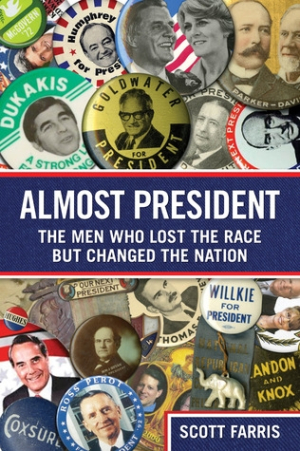Almost President
The Men Who Lost the Race but Changed the Nation
“History is written by the victors, but to ignore the contributions made by losing presidential candidates is to warp our understanding of American history,” says the author in this enlightening and appealing narrative about politicians unfairly called also-rans. The nine losing presidential candidates who Farris concludes made the greatest contributions to political change—Henry Clay, Stephen Douglas, William Jennings Bryan, Al Smith, Thomas Dewey, Adlai Stevenson, Barry Goldwater, George McGovern, and Ross Perot—receive their own chapters, while Al Gore, John McCain, and John Kerry are discussed in one chapter, and others are described in the Appendix.
The earliest losing candidates, as the reader will quickly note, led movements for major political change while the country was young and political factions were evolving into the modern Democratic and Republican parties. Henry Clay, “the greatest legislator in American history,” according to the author, set the framework for liberalism and the Republican Party of Lincoln. Stephen Douglas lost the 1860 election to Lincoln but established the precedent for the loyal opposition, which allowed Lincoln to govern the wartime nation with more authority than he would have had without Democrats constructively challenging his policies. Thomas Dewey, who the author arguably claims is the twentieth century’s most influential Republican, advocated pragmatism that became the blueprint for Eisenhower, Nixon, and to a lesser extent, Reagan and the first Bush.
More recent losing candidates, such as Stevenson, McGovern, and Perot, made vaguer contributions: Stevenson set an intellectual tone for candidates and helped the Democrats shed the image of being the party of big city bosses. George McGovern’s inclusive movement gave more clout to women and minorities, and Ross Perot’s anti-elitism brought about calls for budget reductions and term limits. As significant as these changes were, they did not lead to immediate success for the movements these candidates led.
The author has also been a political player, as the former Bureau Chief for UPI, the 1998 Democratic congressional nominee from Wyoming, and the manager of several political campaigns. Here he offers a different take on politics, from the view of losers who ended up winners and leaders. General readers as well as political scholars and politicians will read this informed account with interest.
Reviewed by
Karl Helicher
Disclosure: This article is not an endorsement, but a review. The publisher of this book provided free copies of the book to have their book reviewed by a professional reviewer. No fee was paid by the publisher for this review. Foreword Reviews only recommends books that we love. Foreword Magazine, Inc. is disclosing this in accordance with the Federal Trade Commission’s 16 CFR, Part 255.

